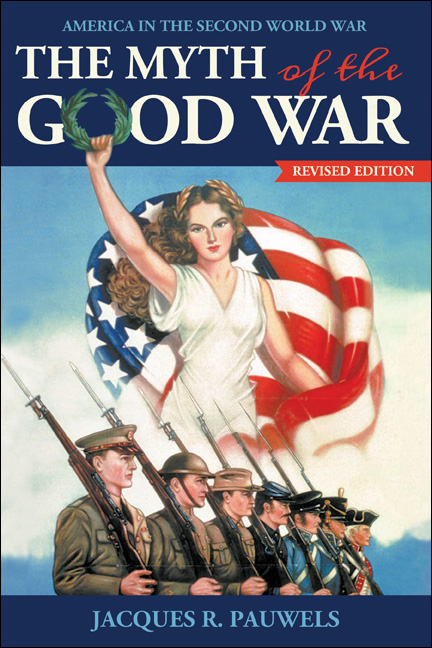The Myth of the Good War
America in the Second World War, revised edition
by Jacques R. Pauwels
In the spirit of historians Howard Zinn, Gwynne Dyer, and Noam Chomsky, Jacques Pauwels focuses on the big picture. Like them, he seeks to find the real reasons for the actions of great powers and great leaders. Familiar Second World War figures from Adolf Hitler to Franklin D. Roosevelt and Joseph Stalin are portrayed in a new light in this book. The decisions of Hitler and his Nazi government to go to war were not those of madmen. Britain and the US were not allies fighting shoulder to shoulder with no motive except ridding the world of the evils of Nazism.
In Pauwels' account, the actions of the United States during the war years were heavily influenced by American corporations -- IBM, GM, Ford, ITT, and Standard Oil of New Jersey (now called Exxon) -- who were having a very profitable war selling oil, armaments, and equipment to both sides, with money gushing everywhere. Rather than analyzing Pearl Harbor as an unprovoked attack, Pauwels notes that US generals boasted of their success in goading Japan into a war the Americans badly wanted. One chilling account describes why President Truman insisted on using nuclear bombs against Japan when there was no military need to do so. Another reveals that Churchill instructed his bombers to flatten Dresden and kill thousands when the war was already won, to demonstrate British-American strength to Stalin.
Leaders usually cast in a heroic mould in other books about this war look quite different here. Nations that claimed a higher purpose in going to war are shown to have had far less idealistic motives. The Second World War, as Jacques Pauwels tells it, was a good war only in myth. The reality is far messier -- and far more revealing of the evils that come from conflicts between great powers and great leaders seeking to enrich their countries and dominate the world.
About the Author
Reviews
Jacques Pauwels is hands down one of the most important historians writing today. His work combines profound erudition with pristine clarity. He has a unique ability to channel his expansive historical knowledge into pedagogical narratives that carefully walk the reader through extremely complex historical developments. The result is, quite simply, a series of the best books on modern and contemporary history that can—and should!—be read by both specialists and complete novices. Moreover, his commitment to the tradition of what Domenico Losurdo referred to as “counter-history” leads his readers through the looking glass, so to speak. Instead of the hackneyed stories peddled by the mainstream media and educational institutions, he delivers to his readers truly insightful, and sometimes surprising, accounts of what actually happened. His books are thus real page turners that are enthralling to read and amenable to a very large audience. I regularly teach his work and recommend it to students, professors and other interested parties. I have only heard praise of his work from those to whom I’ve recommended it.





